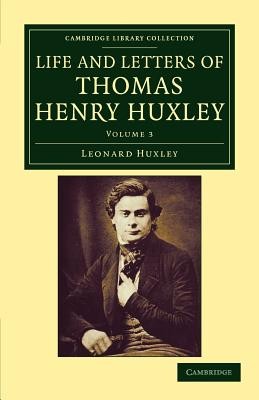
- We will send in 10–14 business days.
- Author: Leonard Huxley
- Publisher: Cambridge University Press
- ISBN-10: 1108040489
- ISBN-13: 9781108040488
- Format: 14 x 21.6 x 2.9 cm, softcover
- Language: English
- SAVE -10% with code: EXTRA
Reviews
Description
Thomas Henry Huxley (1825-95), the English biologist and naturalist, was known as 'Darwin's Bulldog', and is best remembered today for his vociferous support for Darwin's theory of evolution. He was, however, an influential naturalist, anatomist and religious thinker, who coined the term 'agnostic' to describe his own beliefs. Almost entirely self-educated, he became an authority in anatomy and palaeontology, and after the discovery of the archaeopteryx, he was the first to suggest that birds had evolved from dinosaurs. He was also a keen promoter of scientific education who strove to make science a paid profession, not dependent on patronage or wealth. Published in 1903, this three-volume work, edited by his son Leonard Huxley, is the second and most complete edition of Huxley's biography and selected letters. Volume 3 covers the period 1887-95, during which Huxley battled ill-health while continuing to defend his scientific ideals.
EXTRA 10 % discount with code: EXTRA
The promotion ends in 20d.15:38:38
The discount code is valid when purchasing from 10 €. Discounts do not stack.
- Author: Leonard Huxley
- Publisher: Cambridge University Press
- ISBN-10: 1108040489
- ISBN-13: 9781108040488
- Format: 14 x 21.6 x 2.9 cm, softcover
- Language: English English
Thomas Henry Huxley (1825-95), the English biologist and naturalist, was known as 'Darwin's Bulldog', and is best remembered today for his vociferous support for Darwin's theory of evolution. He was, however, an influential naturalist, anatomist and religious thinker, who coined the term 'agnostic' to describe his own beliefs. Almost entirely self-educated, he became an authority in anatomy and palaeontology, and after the discovery of the archaeopteryx, he was the first to suggest that birds had evolved from dinosaurs. He was also a keen promoter of scientific education who strove to make science a paid profession, not dependent on patronage or wealth. Published in 1903, this three-volume work, edited by his son Leonard Huxley, is the second and most complete edition of Huxley's biography and selected letters. Volume 3 covers the period 1887-95, during which Huxley battled ill-health while continuing to defend his scientific ideals.


Reviews